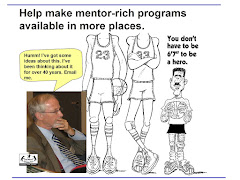While you're thinking about that I encourage you to read this article titled An introduction to hacking the future
In my comments below the "quoted text" refers to ideas taken from this article.
While the word "hacking" conjures up negatives in my mind, such as someone taking over my web site, or taking over a big government web site, this article opens me to a new way of thinking about hackers. It describes a community of people who are "sharing of knowledge within communities of interest or practice".
The article describes hackers as a community of people who recognize that "where many people are able to contribute their individual knowledge to a coding problem collectively – the ability to solve that problem rises exponentially."
 This graphic is one of many I use to illustrate my goal of helping people from around Chicago, the US and the world connect with myself and each other "to create the future they want to exist in".
This graphic is one of many I use to illustrate my goal of helping people from around Chicago, the US and the world connect with myself and each other "to create the future they want to exist in".In the middle is a "birth to work" message showing that the goal of the Tutor/Mentor Institute, LLC and Tutor/Mentor Connection is to support the efforts of leaders in every sector who are working to help more kids move from living in poverty to working in 21st century jobs and careers once they are adults.
In the links and program locator library at http://www.tutormentorconnection.org I point to more than 2000 organizations already doing something focused on youth, poverty, philanthropy, workforce development, education, etc. Many of the web sites I point to have libraries that point to thousands of other sites.
If we can connect enough of the people and ideas who are already working to help kids in poverty move to adult lives free of poverty we can create a community where we can "imagine solutions to what others thought to be impossible".
We can "creatively explore what new forms of possibility might look like."
If business leaders engage their current employees in this process, they begin to learn how to be part of this connected and collaborative community and they bring back their knowledge to the workforce.
If a greater number of volunteer-based tutor/mentor program and social justice organization leaders can find ways to engage in this process they connect their organizations with a much wider range of ideas and resources and partners that can enable them to stay in business and connected to youth and volunteers for longer time frames and with greater long-term impact.
If young people are engaged in this process from the time they are in elementary school they grow up and enter their adult lives already embedded with the ideas of this "hacker" philosophy. They become the talent business and society need to innovate new solutions to complex problems that will face us well into the future.
Sharing these articles with you and others is just one step in trying to build this connected "hacker" community.








1 comment:
This article on Ethan Zukerman's blog adds additional thinking about this topic. http://www.ethanzuckerman.com/blog/2012/01/25/beth-kolko-hackademia-leveraging-the-conflict-between-expertise-and-innovation-to-create-disruptive-technologies/
Post a Comment